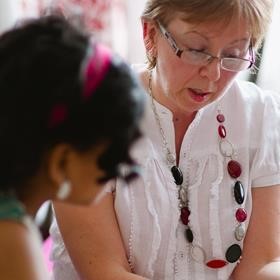Ailsa Swarbrick: Carving a new path
It’s more than a week since the Family Nurse Partnership (FNP) trial report was published and we are now in new territory. Few would dispute that it’s a good idea to have robust evidence for complex social interventions, but FNP is unusual in England having undergone the scrutiny of an RCT. This means there is no “how to” guide telling us how to use this learning well, constructively and in a real world environment. I’m really pleased that it looks as if lots of people, at every level of the system, are committed to working with us to take this next step and improve the impact made for vulnerable teen mums and their babies.
We met all the FNP supervisors last week, on the day the report was published, and their commitment and passion was palpable. They wanted to know the detail, and how they could get involved in improving and adapting FNP for this country. They were honest and have views, based on many years of professional practice and first-hand experience of being invited into the homes of extremely vulnerable young families, and of supporting their aspirations when others have written them off. The trial report endorsed the skills and the ability of family nurses to engage young women in a trusting and enduring relationship which can lead to change, and we must continue to listen and learn from family nurses’ experience as we go forward. We must also listen to what families tell us is their experience of FNP and how it helps them.
Local authority commissioners, who now hold the purse strings for early years’ public health have been talking about what they want for their populations, in their local communities, about the outcomes they really value, how they want to monitor these being achieved and how they want to apply learning from FNP across other early intervention services. In these early days, our conversations with them suggest that evidence on child development and safeguarding are strong reasons for commissioning FNP, from this trial and also from other research and from what they see locally with their own eyes. It looks as if many are committed to prevention and thinking long term, despite the immediate financial pressures they are facing. They are also telling us that they are keen to work with us to make a difference in key outcome areas such as stopping smoking in pregnancy – where there is the potential to make a huge difference to health for both mothers and babies, as last Friday’s Smoking in Pregnancy Challenge Group report told us.
Many partners, such as the Local Government Association, the Early Intervention Foundation and the Wave Trust have commented and debated about the contribution this research makes to learning about early intervention in this country, about what the evidence tells them and what it doesn’t, and about the importance of adapting FNP to fit our children, family and social care context.
Over the last eight years, we’ve been on a journey translating research into practice and it feels we are now ready to carve out a new path. We want to answer quickly the question “what next?” while taking the time to learn from evidence, experts, the latest science and delivery experience. Over the coming months we plan to start designing changes to the way smoking cessation and pregnancy planning is addressed in FNP; we will consider whether the target group is right, and we will look again at which outcomes are priorities for FNP to effect and how family nurses can best use their professional judgement to improve them in partnership with other services locally. We will share our reflections openly, starting with a blog next week outlining what we have learned about smoking in pregnancy.
This will be challenging work but we have great opportunities - afforded us by the scale of FNP, the skills of the workforce, the commitment of other experts, commissioners and the continued aspirations of FNP clients to do the best for themselves and their babies.
